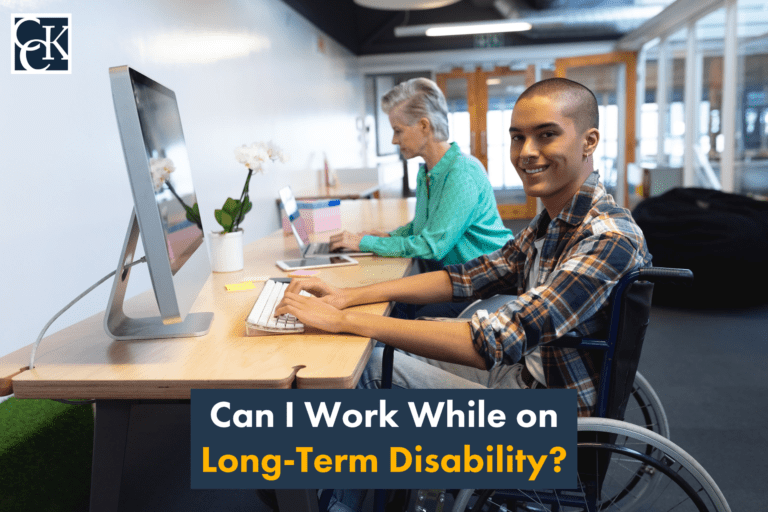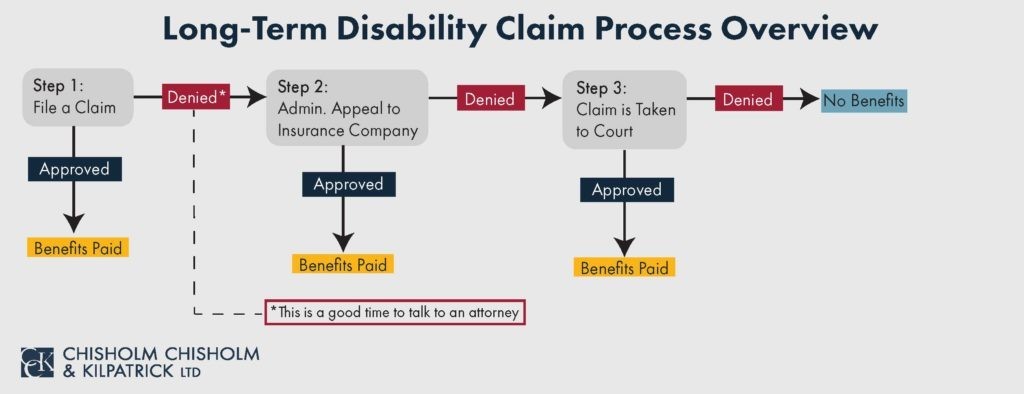Can I Work While on Long-Term Disability?

It is not uncommon for a claimant receiving long-term disability (LTD) benefits to wish to return to work in some capacity. While it can be difficult, it is possible under certain long-term disability policies. If you are collecting long-term disability insurance benefits and want to return to work, you will need to proceed carefully to avoid putting your benefits in jeopardy.
To find out if you can work while still receiving long-term disability benefits, you need to read your policy carefully. There may be specifications about what type of work you can do, how much money you can earn, or how long you are allowed to work before it affects your benefits. The impact that returning to work will have on your long-term disability benefits is determined by these detailed provisions within your policy and your definition of disability.
Working Within the Own Occupation Definition of Disability
Often, claimants receiving benefits under the own occupation definition of disability have greater freedom to attempt to return to work than those receiving benefits under the any occupation definition of disability. Generally, the own occupation definition of disability defines disability as one that impairs you from carrying out the duties of the occupation you were performing at the time you became disabled. Therefore, it may be possible to work in a new occupation and still meet the own occupation definition of disability.

For example, if a firefighter is no longer able to work due to a condition that impairs them from performing physical activities, they may still be able to work in a less physically demanding profession. They may pick up a new job in an unrelated field, such as a sedentary, administrative position. This new profession typically would not violate the own occupation definition of disability in their policy, and they may be able to continue getting long-term disability benefits while working their new job.
However, this can depend on the specific terms of your disability policy. Some policies may provide that you cannot work and still receive long-term disability benefits. Other policies may have return-to-work incentive provisions that encourage you to return to the workforce as long as you are within the bounds of certain restrictions.
Return-to-Work Incentives
Your insurance company wants you to return to work. The sooner you are back in the workforce, the sooner you may become ineligible for benefits. For this reason, many policies include return-to-work incentives.
This incentive will vary depending on the policy and may limit what type of work you can do. Some return-to-work incentives allow only part-time work. Others may allow you to work full-time, but place limits on the amount you can earn and still receive benefits. For example, a return-to-work incentive may allow you to pick up work that will not affect your benefits, provided that your combined work and disability earnings do not exceed 100 percent of your pre-disability earnings. Typically, if your combined earnings exceed 100 percent of your pre-disability earnings, your insurance company may begin reducing your benefits to offset the extra income.
The return-to-work incentive may also have limitations on the period of time you can work until your insurance company begins implementing offsets. Often after 24 months, your insurance company may begin deducting a percentage of your work income from your long-term disability benefits, regardless of how your current work earnings compare to your pre-disability earnings. You should consult your specific policy to determine what your insurance company allows in their return-to-work incentive.
Alternatively, your policy may specify a formula that is used to determine how any work earnings will impact your monthly long-term disability benefit. Often, these formulas examine how your current earnings compare to your pre-disability earnings and pay a portion of the long-term disability benefit based on the amount of income you have lost due to your disability.
Finally, many return-to-work incentives also provide that, if your work earnings exceed a certain percentage of your pre-disability earnings, then long-term disability benefits will end.
Working Within the Any Occupation Definition of Disability
Long-term disability policies often transition from the own occupation definition of disability to the any occupation definition of disability after a certain period of time, often after 24 or 48 months of benefits. Returning to work within the any occupation definition of disability may be trickier. The any occupation definition of disability generally requires that your condition disables you from any occupation in the greater workforce.

Under this definition, your policy may not allow for you to work and still receive benefits. If you are working while the insurance company is paying benefits under the own occupation definition of disability, your benefits could be terminated when your policy switches to the any occupation definition of disability.
However, depending on the specific terms of the any occupation definition of disability, some policies do allow you to work in some capacity and still receive benefits under that definition. For example, the any occupation definition of disability in your policy may require you to be disabled from any full-time occupation, such that you could work part-time and still potentially receive benefits. Alternatively, the any occupation definition of disability in your policy may only require you to be disabled from occupations that earn a certain percentage of your pre-disability earnings, meaning you can still potentially receive benefits, even if you are able to work in jobs that earn less than that amount.
If you are able to work and still receive long-term disability benefits under the any occupation definition of disability, your policy will outline how your work earnings will affect your monthly benefit as explained above.
Seek Guidance Before Returning to Work
It is important to keep in mind that, even if your policy allows you to return to some type of work and still receive long-term disability benefits, the insurance company may still try to use your return to work as evidence that you are no longer disabled under the terms of your policy. If you wish to return to work, you may want to seek professional advice before you begin filling out job applications. It is important to consult your doctor, who may be able to advise you on your specific limitations and provide guidance as to what you should and should not do within the restrictions of your condition.

This can ensure safe conditions that are manageable with your illness, while also providing evidence to your insurance company that your disability still impairs you. If your doctor gives you permission to return to work but does not provide additional evidence of your restrictions, your insurance company may deduce that you are recovered or no longer disabled and may use that as a reason to terminate your benefits.
You may also want to seek the advice of an attorney. An experienced long-term disability attorney may be able to assess your policy and help you understand what kind of work you can do within its boundaries. An attorney may be able to help you avoid any mistakes that could result in the termination of your benefits. If you do return to work in a way you believe is permissible within your policy and your insurance company terminates your benefits, an attorney may also be able to help you fight back.
Alternatively, if your doctor or attorney advises you not to return to work, perhaps because it would aggravate your condition or put your benefits in danger, it may be wise to follow their instruction. You do not want to risk worsening your condition or losing your benefits. By heeding their advice and taking care of your health now, you may be able to return to work in the future.
Contact Chisholm Chisholm & Kilpatrick for Help
If you wish to try and return to work while still receiving long-term disability benefits, it may be beneficial to seek the help of an LTD attorney. Chisholm Chisholm & Kilpatrick’s attorneys have experience handling such cases and can evaluate your policy to ensure you are proceeding within the bounds of your plan. If you are appealing a loss of benefits, our team can help you fight back. Our lawyers have over 33 years of combined experience working with long-term disability law and are available to assist you with your case as you try to return to work. You can contact our team for a free case evaluation at 800-544-9144 or by reaching out online.

About the Author
Share this Post

